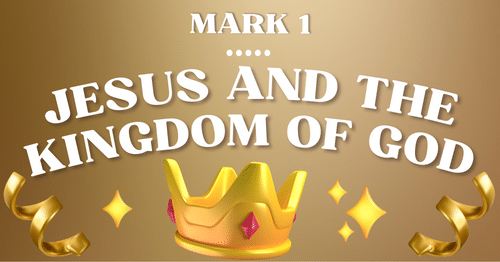Mark 1 • Jesus and the Kingdom of God

AI was not used to generate this post.
At the beginning of His ministry, Jesus announced that “the kingdom of God has come near.” What did He mean by that? What is the kingdom of God? How does it affect our lives today? In a previous post, I shared how God worked in the background to ready the world for His Son to make His appearance. The declaration of the angels at Jesus’ birth announced part of what His purpose on earth would be. His purpose for coming to earth are part of the gifts of Christmas we celebrate every year. In this article, we will explore what the kingdom of God is, Jesus’ role in it, and what that means for us today.
Key Takeaways
- Jesus announced that the kingdom of God has come near, emphasizing its importance in our lives today.
- God’s kingdom began at creation, establishing Him as the ultimate ruler over all creation through a theocratic system.
- Israel became a theocratic nation under God’s rule, but later demanded a human king, leading to a representative monarchy.
- Jesus is the promised Messiah who offers entrance into His kingdom, which is both spiritual in the present and physical in the future.
- The kingdom of God reflects God’s rule, bringing peace and righteousness when fully established through Jesus’ return.
Listen to this blog as a similar podcast from our Heartbreak to Hope Bible Study of Mark.
The Time Has Come
The gospel of Mark begins with, “The beginning of the good news about Jesus Christ, the Son of God.” Right away, we know that an announcement is being made. Something is happening that is good news. Long-awaited news.
At the beginning of His ministry, Jesus Himself announced,
“The time has come…The kingdom of God has come near. Repent and believe the good news!” (Mark 1:15)
The kingdom of God has come near. And God is expecting a response from people.
What is the kingdom of God? Let us start at the beginning.
God’s Kingdom Began at Creation
More than thirty times in the Old Testament, God is spoken of as “king.” The whole idea of kingship is God’s idea. It did not start with humans.
When we talk about God as king, we are talking about the rule of God Almighty over His entire creation, including all people. God the King has always been Sovereign and all powerful. His kingdom is eternal.
His dominion is an eternal dominion; his kingdom endures from generation to generation. (Daniel 4:34b)
At creation, God set up a theocratic kingdom (theo means “God;” cratic means “rule or government”). That is, God is the ultimate ruler. But, He chose to give Adam and Eve responsibility over the earth. This is the expression of humanity bearing the image of our Creator and sharing, as God’s servants, in God’s kingly rule over the creation. God was their king who walked and talked with them on the earth. God gave them freedom in many areas as well as accountability in one area—not to eat the fruit of one specific tree. That is all.
Adam and Eve disobeyed God in that one area of accountability. Because sin separated people from a direct relationship with God, God’s rule became a representative rule through delegated authorities.
“As for me, this is my covenant with you: You will be the father of many nations. No longer will you be called Abram; your name will be Abraham, for I have made you a father of many nations. I will make you very fruitful; I will make nations of you, and kings will come from you. (Genesis 17:4-6)
To Jacob, God said this…
And God said to him, “I am God Almighty; be fruitful and increase in number. A nation and a community of nations will come from you, and kings will be among your descendants. (Genesis 35:11)
Jacob said this to his son Judah…
“The scepter will not depart from Judah, nor the ruler’s staff from between his feet, until he to whom it belongs shall come and the obedience of the nations shall be his.” (Genesis 49:10)
“Let everyone be subject to the governing authorities, for there is no authority except that which God has established. The authorities that exist have been established by God.” (Romans 13:1)
God delegates His rule to humans. But His plan included much more.
God Chose Israel to Be a Theocratic Nation
After some time passed, God set up Israel as a theocratic nation. That is, God would be its King. Deuteronomy talks about the Lord becoming the King over the twelve tribes of Israel.
The Lord became king in Israel—when the leaders of the people assembled, when the tribes of Israel gathered as one.” (Deuteronomy 33:5 NLT)
The giving of the Mosaic Law at Mount Sinai was a covenant agreement between God as their King and the people as His subjects. History tells us this agreement mirrored what earthly kings at that time did with their subjects. Then, through the Mosaic Law, the sacrificial system temporarily removed sin from the people so God could dwell with them, which He did.
Israel was not content with the theocracy, though. After about 300 years, the people saw that other nations had a physical king, so they demanded a strong human ruler to be their king. God let them have a king but he had to be one that God had chosen for them. This first king of Israel named Saul was presented to the people and anointed by the High Priest who was God’s representative on earth. Saul’s kingship was still under the covenant agreement between God and His people. The king of Israel was under God’s authority. Yet, when you read through the Old Testament (especially in Kings and Chronicles), you see how often this failed. Many of the kings preferred their own way of doing things over God’s way. See this in our study of 1 and 2 Chronicles.
Yet, those Israelites who trusted in God still considered God to be their ultimate King and considered themselves to be part of His Kingdom within the nation of Israel. You can see this a lot in the psalms.
But God had a future plan in mind. And He began to put His plan into action during the life of David by promising to send a Messiah for Israel.
The Promised Messiah’s Role in God’s Kingdom
Messiah is the English translation of the Hebrew word for “anointed one” or “chosen one.” The Greek equivalent is the word Christos or, in English, Christ. The name “Jesus Christ” is the same as “Jesus the Messiah.”
Hannah’s song in 1 Samuel chapter 2 is the first reference in the Bible to God’s anointed one referring to a king.
“It is not by strength that one prevails; those who oppose the Lord will be broken. The Most High will thunder from heaven; the Lord will judge the ends of the earth. “He will give strength to his king and exalt the horn of his anointed.” (1 Samuel 2:10)
Up to this point, Israel had no earthly king. So, Hannah was prophesying about a future king.
After Saul’s failure to honor God, He chose David to be the next king of Israel. David was a man after God’s heart. He loved God and would represent God well as he ruled Israel though not perfectly. David consistently considered God to be his king and the rightful king over Israel.
Through David, God made a promise to have one of David’s descendants to be on Israel’s throne forever. In the inspired writings of David and Isaiah, God promised His people a future king who would restore God’s complete rule over His people and over all creation. The “Messiah” as a king would differ from earthly kings in that He would also be called Lord. We see this expressed in Psalm 2 and Psalm 110.
Messiah as a descendant of David is one whom God had chosen and enthroned to rule in His name as the official representative of God’s rule over His people. The kingdom of God would once again come to earth. The ultimate fulfillment of this promise is in Jesus.
God Sent Messiah Jesus to Offer Entrance into His Kingdom
Jesus’ birth
The Jews felt they had been in bondage to other powers for centuries. They had not experienced having their own king, a truly Jewish king, in a long time. They longed for Messiah to come and overthrow the Romans especially. They hated the Roman rulers. Jesus was born into this emotionally charged atmosphere.
Before His conception even, the angel Gabriel said this to Mary about Jesus in Luke chapter 1,
He will be great and will be called the Son of the Most High [Son of God]. And the Lord God will give to him the throne of his father David, and he will reign over the house of Jacob forever [that is King], and of his kingdom there will be no end.” (Luke 1:32-33)
At His birth, the angels declared something similar.
Jesus would have the throne of His father David. Jesus was a descendant of David through both Mary and Joseph. So, He qualified for the throne. He would reign over the house of Jacob. That is Israel and also all the people of God who have put their trust in God. His kingdom will have no end. This is the last kingdom that God is setting up for people where He will have direct rule over them. It is implied that people will want God’s rule over them and submit to it.
Jesus’ ministry
At the age of thirty, Jesus made His public proclamation that the kingdom of God was near. For anyone who repented from their lack of faith and believed in Him, Jesus, they would enter that kingdom. It was a forever kingdom. All believers are forever citizens of that kingdom.
For three years, Jesus demonstrated that He is God as He delivered men and women from their physical and spiritual ills. When the time came for Him to move on in His role as Israel’s Messiah, He headed for Jerusalem. At Bethany, He stopped until the way could be prepared so that when He entered the city people would recognize Him as the Messiah.
When Jesus entered Jerusalem on a donkey in Mark chapter 11, the crowds understood that Jesus was presenting Himself as the Messiah capable of bringing in the Kingdom. He entered as a king like David would have entered. The people were filled with joy that Jesus at last was making public proclamation of His Messiahship. All history had pointed towards this single, spectacular event when the Messiah publicly presented Himself to the nation. And God desired that this fact be acknowledged. But the king had to suffer first to deliver His people.
The King Had to Suffer First to Deliver His People
Once in Jerusalem, Jesus was rejected as the King—as God’s representative to rule in God’s place on earth. When He was crucified, the sarcastic sign above His head called Him the King of the Jews. The people did not recognize the time of God’s coming to them. The Jews thought their greatest enemy was the Romans. But God knew better. The greatest enemy of humanity was their sin. Sin separated people from their Creator God. It was God’s plan to deal with sin once and for all so He could have a restored relationship with His creation.
Humans are less sensitive to their sin than they are to their circumstances. The Israelites never could come to grip with their sins. The leaders had their laws. They did not need a savior. Because they declared themselves righteous, God was expected to declare them righteous, too. So, they did not recognize who Jesus really is.
The Jews of Jesus’ day expected the Messiah to redeem Israel by overthrowing the rule of the Romans and establishing an earthly kingdom. It was not until after Jesus’ resurrection that His disciples finally began to understand that the Messiah would first deliver His people spiritually; that is, to redeem them from sin. Later, Jesus the Messiah will deliver His people from their physical enemies, when He sets up His Kingdom on the earth.
Until that time, Jesus is ruling from heaven.
God’s Kingdom—Jesus in Heaven
The time between Jesus’ ascension to heaven and His return to earth is called the “until” time. We get this from Luke chapter 21
They will fall by the sword and will be taken as prisoners to all the nations. Jerusalem will be trampled on by the Gentiles until the times of the Gentiles are fulfilled. (Luke 21:24)
Jesus is waiting “until the times of the Gentiles are fulfilled” before He returns. When that time comes, Jesus will return to set up His Kingdom on earth.
While waiting, we are living in this “until” time. Only God knows when it will end. Every believer in Jesus Christ for the past 2000 years is part of God’s Kingdom, now headquartered in heaven where our King Jesus resides and reigns over planet Earth. We just cannot see it. But we are part of that kingdom if we responded to Jesus’ invitation to repent and believe.
Repent means to change your mind about something. Repentance for Christians means that you changed your mind about Jesus and your sin. You decided that Jesus is who He said He is—the Son of God—who died on the cross for your sins and rose again to give His life to you. You chose to agree with God that you are a sinner and accept His terms of forgiveness for every sin through your faith in His Son. You are in the Kingdom now. Jesus is your King now.
Jesus’ Kingdom is a heaven-initiated kingdom in the until time. Ephesians said that in heaven Jesus is sitting on His throne where He rules …
far above all rule and authority, power and dominion…And God placed all things under his feet and appointed him to be head over everything for the church, which is his body…” (Ephesians 1:21-23)
And Philippians chapter 2 tells us that,
God exalted him [Jesus] to the highest place and gave him the name that is above every name, that at the name of Jesus every knee should bow, in heaven and on earth and under the earth, and every tongue acknowledge that Jesus Christ is Lord, to the glory of God the Father.” (Philippians 2:9-11)
Jesus has all authority over heaven and earth right now. He will one day exercise that authority when He physically rules as king on planet Earth.
God’s Kingdom—Jesus on Earth
The Bible teaches that at the end of a 7-year period commonly called “The Great Tribulation,” Jesus Christ will gloriously return to Earth as He promised. Revelation chapter 19 describes Jesus’ triumphant victory over Satan and his cohorts at the end of the Tribulation. Jesus will bring His physical kingdom to Earth for 1000 years—a millennium—with Jerusalem as His capital. That is in Revelation chapter 20. All will see His visible and glorious Kingdom on the earth after the Second Coming. Revelation 1:5; 17:14; 19:16: 20:4
In Revelation chapter 19, Jesus Christ, the Lamb, is introduced as King of the kings of the earth. In this earthly Kingdom, Jesus Christ will actually be the supreme political ruler as well as the spiritual leader and object of worship. It will be over the entire earth, far beyond the boundaries of any previous earthly kingdom or the kingdom of David himself. The government of Christ will be one of absolute authority and power. No one will be allowed to rebel against the King. It will also be one of righteousness and peace. In establishing this worldwide government, God will have fulfilled His purpose that man should rule the earth. Christ as the last Adam is able to fulfill this goal. All Christians will have been given resurrection bodies and will participate with Christ in administering His earthly kingdom. See “Daniel 9-12: Rest Then Rise to Receive Your Inheritance.”
The Kingdom of God is the dynamic rule of God manifested in Christ to destroy His enemies (sin, death, and Satan) and to bring to men the blessings of God’s reign.
Jesus told His disciples in Matthew chapter 6 that we should pray for His Kingdom to come and for God’s will to be done on Earth as it is done in heaven. That will happen after the “until time” in which we now live. And you, dear Christian, will be in your glorified body back on Earth, doing whatever work Jesus gives to you to do.The good news is that in God’s Kingdom, there will be no more evil and no more destruction. In the future, the current earth and universe will be “delivered from the bondage of corruption into … glorious liberty” (Romans 8:21). God will make them all new again, with all the scars of sin and death burned away by His refining fires. At last, God’s direct rule of His creation will be restored. Jesus offered everyone listening to Him this hope. As believers in Christ, we share in that hope.
While Jesus lived on earth, He demonstrated God’s love to women. You can read about this in “New Testament Women: Trust Jesus to satisfy your heart needs. He also showed many of His followers the blessing of having Him in their homes. Read more about this in “Mark 2: Walking Home with Jesus.”
Let Jesus satisfy your heart with hope, healing, and love as you get to know Him and trust Him more each day.
Read all the articles in the Mark series. The next post is “Mark 2 • Walking Home with Jesus.”
The above information is covered in our Heartbreak to Hope Bible Study of the book of Mark.
AI was not used to generate this post.


